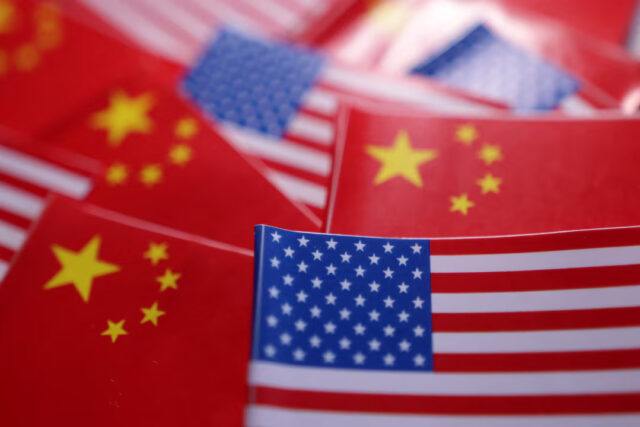
US Treasury Secretary Scott Bessent and chief trade negotiator Jamieson Greer will meet China’s top economic official He Lifeng in Switzerland this weekend, marking a possible first step toward easing the trade war impacting the global economy, officials from both countries said.
News of the meeting late on Tuesday sent US equity index futures sharply higher as trading resumed following a second straight day of losses on Wall Street fueled by uncertainty over US President Donald Trump’s tsunami of tariffs. S&P 500 e-mini futures were about 1% higher.
The meeting with China’s vice premier comes after months of escalating tensions that have seen duties on trade between the world’s two largest economies soar well beyond 100%. This is the first meeting between senior Chinese and American officials since US Senator Steve Daines met Premier Li Qiang in Beijing in March.
The two sides are expected to discuss the reductions of the broader tariffs, two sources familiar with the planning told Reuters.
The negotiating teams are also expected to discuss eliminating duties on specific products, US policies on de minimis and the US export control list, sources said.
China’s State Council did not immediately reply to a faxed request for comment.
Cat-And-Mouse Game
Washington and Beijing have been locked in a cat-and-mouse game over tariffs, with each side unwilling to be seen to back down in a trade war that has roiled global markets and upended supply chains.
The US Trade Representative’s office and Treasury said Greer and Bessent would travel together to Geneva on Thursday and would also meet with Swiss President Karin Keller-Sutter to discuss negotiations over reciprocal trade.
“My sense is this will be about de-escalation,” Bessent told Fox News Channel’s “The Ingraham Angle” after the announcement. “We’ve got to de-escalate before we can move forward.”
China Warns Against Blackmail, Coercion
After the US announcement, a Chinese commerce ministry spokesperson confirmed that China had agreed to meet the US envoys.
“On the basis of fully considering global expectations, China’s interests, and the appeals of US industry and consumers, China has decided to re-engage the US,” the Chinese statement said.
“There is an old Chinese saying: Listen to what is said, and watch what is done. … If (the US) says one thing but then does another, or attempts to use talks as a cover to continue coercion and blackmail, China will never agree.”
Mixed Signals
Trump and his trade team have sent mixed signals over progress in talks with major trading partners rushing to cement agreements with Washington and avoid the imposition of hefty import taxes on their goods.
Bessent told lawmakers earlier in the day that the Trump administration was negotiating with 17 major trading partners, but not yet China, and could announce trade agreements with some of them as early as this week.
Trump told reporters before a meeting with Canadian Prime Minister Mark Carney that he and top administration officials will review potential trade deals over the next two weeks to decide which ones to accept, triggering a slide in stocks.
Bessent told Fox News the two sides would work out during their meeting on Saturday “what to talk about.”
“Look, we have a shared interest that this isn’t sustainable,” Bessent said. “And 145%, 125% is the equivalent of an embargo. We don’t want to decouple. What we want is fair trade.”
Widening Trade Gap
Trump and his top officials have held a flurry of meetings with trading partners since Trump announced a 10% tariff on most countries on April 2, along with higher tariff rates that will kick in on July 9, barring separate trade agreements. Trump has also imposed 25% tariffs on autos, steel and aluminum, 25% tariffs on Canada and Mexico, and 145% tariffs on China, with further duties expected on pharmaceuticals in coming weeks.
China responded by boosting its tariffs on US goods to 125%. The European Union is also readying countermeasures.
“I look forward to productive talks as we work towards rebalancing the international economic system towards better serving the interests of the United States,” Bessent said in a statement.
Trump’s moves on tariffs, which he says are aimed in part at reducing the US trade deficit, are so far having an opposite effect.
The US Commerce Department on Tuesday said the trade gap mushroomed to a record in March as businesses rushed to import goods ahead of tariffs. The data highlighted a dynamic that helped drive gross domestic product into negative territory in the first quarter of 2025 for the first time in three years.
In particular, an effort by drug makers to beat tariffs that Trump has threatened to impose on the sector led to a record surge in pharmaceutical imports. Notably, though, the US trade deficit with China narrowed sharply as the crushing levies Trump has imposed cut deeply into Chinese imports.
Deal With Britain
US and Britain have made good progress in negotiating a trade deal that would likely include lower tariff quotas on steel and autos, a British official said, while cautioning it was too soon to predict when a deal would be signed.
The talks, led on the US side by USTR and the Commerce Department, were expected to result in lower-tariff quotas for steel and autos, with talks still continuing about the UK digital services tax, the official added.
Bessent told Fox News Channel that many countries, including Indonesia, had come with very good offers to reduce tariffs and non-tariff barriers, such as subsidies.
Before his meeting with Carney, Trump said the United State-Mexico-Canada Agreement, which was signed during his first term and is due to be reviewed next year, may be renegotiated, although he questioned whether that was “even necessary.”
Carney told reporters later that no decisions were made on tariffs during his meeting with Trump.
(With inputs from Reuters)




